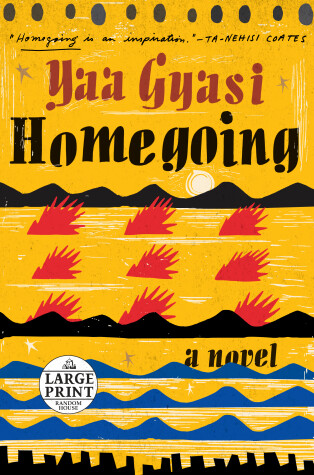
Winner of the NBCC's John Leonard First Book Prize
A New York Times 2016 Notable Book
One of Oprah’s 10 Favorite Books of 2016
NPR's Debut Novel of the Year
One of Buzzfeed's Best Fiction Books Of 2016
One of Time's Top 10 Novels of 2016
“Homegoing is an inspiration.” —Ta-Nehisi Coates
The unforgettable New York Times best seller begins with the story of two half-sisters, separated by forces beyond their control: one sold into slavery, the other married to a British slaver. Written with tremendous sweep and power, Homegoing traces the generations of family who follow, as their destinies lead them through two continents and three hundred years of history, each life indeliably drawn, as the legacy of slavery is fully revealed in light of the present day.
Effia and Esi are born into different villages in eighteenth-century Ghana. Effia is married off to an Englishman and lives in comfort in the palatial rooms of Cape Coast Castle. Unbeknownst to Effia, her sister, Esi, is imprisoned beneath her in the castle’s dungeons, sold with thousands of others into the Gold Coast’s booming slave trade, and shipped off to America, where her children and grandchildren will be raised in slavery. One thread of Homegoing follows Effia’s descendants through centuries of warfare in Ghana, as the Fante and Asante nations wrestle with the slave trade and British colonization. The other thread follows Esi and her children into America. From the plantations of the South to the Civil War and the Great Migration, from the coal mines of Pratt City, Alabama, to the jazz clubs and dope houses of twentieth-century Harlem, right up through the present day, Homegoing makes history visceral, and captures, with singular and stunning immediacy, how the memory of captivity came to be inscribed in the soul of a nation.
It feels like this was written to be required reading in high school— and not in the bad way, where you hold an eternal grudge against an author because you were forced to read them for grades. It’s a primer on the narratives that get willfully erased, spanning generations of America’s (and Britain’s, and humanity’s) evils. You know, all the stuff you’re NOT taught in school.
Ultimately, as is sometimes the case, its upsides are also its downsides, when it spans those generations at the cost of nuanced, complicated characters that would make me feel the story even more deeply. But what it does, it does well. Beyond well. I only hope this has a future on a lot of must-read lists, young and old.
Reading updates
-
Started reading
-
5 June, 2017:
Finished reading
-
5 June, 2017:
Reviewed
